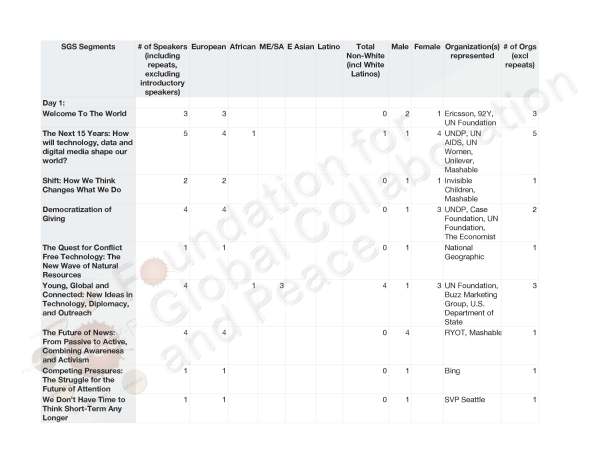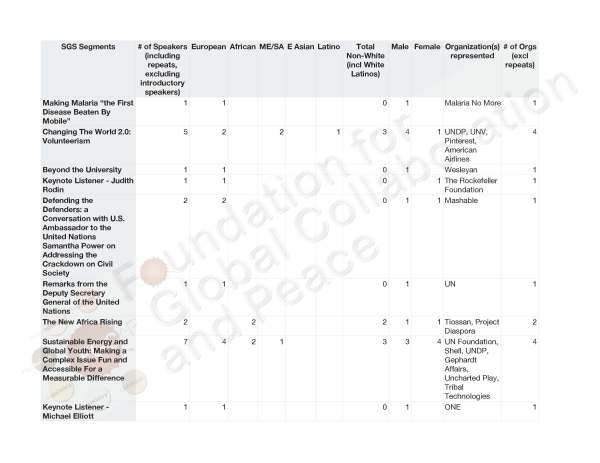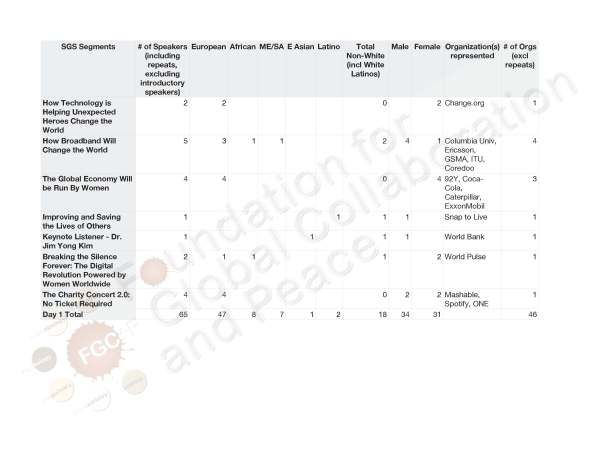1. Is this a PR event or something that’s supposed to inspire young people to rise up as grassroots activists?
The reason why I pose this question is because the summit brandished name-brand corporations (see table at bottom) like it was a sporting event. Moreover, some of these brands are not exactly known for doing a lot of social good, such as ExxonMobil and Shell.
Additionally, during the “Young, Global and Connected” panel, Tina Wells (CEO & Founder, Buzz Marketing Group) gushed about brands as if they were going out of style. Later, Ian Somerhalder (of The Vampire Diaries fame) prattled unintelligibly about his pet-project, RYOT, whose co-founders were as willing as Fox News anchors to let the end justify the means, by giving the thumbs up to featuring cat videos. (Yeah, they’re adorable, I get it, but they lower the already lowering standard of news, which would make RYOT just an established-news-channel wannabe rather than anything really edgy.)
As if that wasn’t bad enough, it was heartbreaking to see viral-attendant numbers (in the English-version) plummet by 1/3, from close to 2,000 to about 1,200, after the segment featuring our “celebrity-god” and beyond frustrating to read the text swoons before, during and after the panel. More discouraging was the fact that Ian failed to ask his fan base to watch the rest of the summit, which introduced some innovative, smaller nonprofits and social enterprises (such as SVP Seattle and Uncharted Play), albeit sandwiched between panels with big, brand-named company speakers.
While I applaud celebrities who use their fame to make the world a better place (whether by acting in films that feature social issues, like Ellen Page, or spearheading social causes, like Edward Norton), our star-worship doesn’t exactly encourage everyday folks to think s/he can affect change on her/his own, without first achieving fame. Today, given the power of social media, it is especially important to underscore the ability of individuals to make the world a better place, in however a small way it may seem, because they all add up to momentous change, such as that demonstrated by Arab Spring.
Speaking of individual power, for a summit whose panelists continually invoked the world’s youth potential, given its theme of 2030NOW, today’s events disappointingly featured only one teenager: Emma Axelrod of Montclair, New Jersey, who, along with her schoolmates, Elena Tsemberis and Sammi Siegel, successfully petitioned for a female moderator (the first in 20 years!) during the 2012 US Presidential debate. Surely, many more young activists like her could, and should, have taken stage to inspire those tuning in worldwide of their own potential to bring about social change in their respective communities!
2. A bright spot worth more exploration
One incredibly important presentation, given by National Geographic photographer Marcus Bleasdale during the segment “The Quest for Conflict Free Technology: The New Wave of Natural Resources” spotlighted e-gadget users’ complicity in child and slave labor, environmental erosion and the death and misery caused by the continuation of the blood-mineral funded civil war in the Democratic Republic of Congo. Given the summit’s theme featuring technology’s role in furthering social good, the talk was very topical in pointing out a problem that exists right under our noses, that has gone unnoticed by the public for too long. The summit organizers would have driven home this point and provided a tie in to its youth-targeted marketing if it had also followed the presentation with a panel discussion on the various facets of mineral sustainability and potential solutions for the world’s millions of e-gadget lovers. This would have been easy to achieve, although potentially politically dangerous, given the presence of various mobile providers and Anne Bouverot, the Director General of the mobile-industry organization GSMA. (If you would like to learn more about conflict minerals, check out Blood in the Mobile and Blood Coltan, documentary films by Frank Piasecki Poulsen and Patrick Forestier, respectively.)
3. Whatever happened to diversity?
Aside from the panels mentioned above, the “Global Economy Will be Run By Women” panel was overrun by big-company executives, with no representation by male executives who have a record of mentoring and/or promoting female talent, SME women entrepreneurs or even a UN Women staffer, who could have given attendees statistics and anecdotal evidence on how women are being entrepreneurial or leading in businesses all over the world. Given that gender-base stereotypes are not only detrimental for women, but for men as well, getting men involved in achieving gender equality is critical. As noted recently by Laura Bates, founder of the @everydaysexism project, during a UK Guardian-newspaper podcast on “Violence against women in the digital realm”: “The benefit of solving [gender inequality] is for everybody.”
The “New Africa Rising” panel consisted of one (ONE!) featured person, the Senegalese-born, European-bred CEO of Tiossan, Magatte Wade, an entrepreneur who happens to espouse the belief in a free-market economy (conveniently echoed by other panelists later during the day), as if even the most impoverished parts of Africa weren’t already teeming with entrepreneurs (FYI, a road-side vegetable vendor is an entrepreneur!) and businesses of many hues, some of whose owners are exploiting their workers and keeping the wealth from trickling down to the general public (think of mineral exporters and freighters in the DRC).
Given that Africa is the 2nd largest continent, with 54 countries, diverse economies, a range of political stability, people speaking over 2,000 (maybe even over 3,000) languages, and producing some of the world’s oldest civilizations, it is utterly shameful to perpetuate the stereotyped homogeneity of Africans, offering one measly example of the many African men and women (i.e., the participants of Maker Faire Africa, an innovation fair in Nigeria, South African journalist Redi Tlhabi, the host of weekly segment South2North or Kenya’s Wanuri Kahiu, director of the country’s first sci-fi film, Pumzi, etc.) who are helping their respective countries raise their voices on the world stage!
Lastly, while the ratio between female and male speakers was pretty even (31 to 34, respectively), the fact that only 18 (27.7% or about 1 in 3) of the 65 speakers today (not including introductory speakers, which would have skewed the count even more) were non-white (or 16, 24.6% or slightly less than 1 in 4, if not counting white Latinos, see breakdown in table below) is worrying, given that the summit is supposed to be a reflection of what’s to come in 2030. Considering the fact that this event is broadcasted globally (to over 100 countries, according to one of the announcements), it would have been nice, if not wise from a marketing perspective, to present a more diverse pool of speakers, ethnically, socially and economically.






